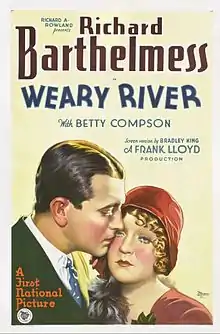Weary River
Weary River is a 1929 American romantic drama film directed by Frank Lloyd and starring Richard Barthelmess, Betty Compson, and William Holden.[1] Produced and distributed by First National Pictures, the film is a part-talkie, part-silent hybrid made at the changeover from silent to sound movies. Based on a story by Courtney Riley Cooper, the film is about a gangster who goes to prison and finds salvation through music while serving his time. After he is released and falls back into a life of temptation, he is saved by the love of a woman and the warden who befriended him. The film received a nomination for an Academy Award for Best Director in 1930.[2]
| Weary River | |
|---|---|
 Theatrical release poster | |
| Directed by | Frank Lloyd |
| Produced by | Richard A. Rowland |
| Written by | Paul Perez (titles) Thomas J. Geraghty (dialogue - uncredited) |
| Screenplay by | Bradley King (screen version) |
| Story by | Courtney Riley Cooper |
| Starring | |
| Cinematography | Ernie Haller Alvin Knechtel (special photography) |
| Edited by | Edward Schroeder James Gibbon |
Production company | |
| Distributed by | First National Pictures |
Release date |
|
Running time | 86 minutes (8 reels) |
| Country | United States |
| Language | English |
Weary River was preserved at the Library of Congress and restored by the LoC, UCLA Film and Television Archive, and Warner Bros. It is available on DVD directly from the Warner Archive Collection.[3][4]
While Barthelmess's character sings and plays the piano throughout the film, Barthelmess did not sing or play the piano. Frank Churchill played the piano, and Johnny Murray sang into a microphone far away from Barthelmess while he lip-synced and played a piano that had strings deadened with felt.[5]
Plot
Jerry Larrabee (Richard Barthelmess) is framed by rival gangster Spadoni (Louis Natheaux) and sent to prison, where he is befriended by a kind and understanding warden (William Holden). Through the warden's patient influence, Jerry becomes interested in music and forms a prison band, broadcasting over the radio. Jerry's singing deeply moves his radio listeners, and soon Jerry is given a pardon by the governor.
Jerry pursues a singing career in vaudeville, billing himself as the Master of Melody, but constant whispers of "Convict!" from the audience disturb his concentration. Moving from job to job, Jerry is haunted by his past. With no hope of succeeding in music, Jerry returns to his old gang and takes up with his former sweetheart Alice Gray (Betty Compson). As he prepares for a final confrontation with Spadoni, Alice gets in touch with the warden, who arrives on the scene in time to keep Jerry on the straight and narrow path. Jerry eventually becomes a radio star and marries Alice.
Cast
- Richard Barthelmess as Jerry Larrabee
- Betty Compson as Alice Gray
- William Holden as Warden
- Louis Natheaux as Spadoni
- George Stone as Blackie
- Raymond Turner as Elevator Boy
- Gladden James as Manager
- Johnny Murray as Jerry Larrabee's singing voice (uncredited)[5]
References
- "Weary River". Internet Movie Database. Retrieved September 5, 2018.
- "Awards for Weary River". Internet Movie Database. Retrieved September 5, 2018.
- "Progressive Silent Film List: Weary River". silentera.com. Retrieved September 5, 2018.
- The American Film Institute Catalog Feature Films: 1921-30. The American Film Institute, c. 1971.
- Larkin, Mark (July 1929). "The Truth About Voice Doubling". Photoplay. New York: Photoplay Publishing Co.
External links
- Weary River at IMDb
- Weary River at the TCM Movie Database
- Synopsis at AllMovie
- Weary River at the American Film Institute Catalog
- Weary River at Virtual History